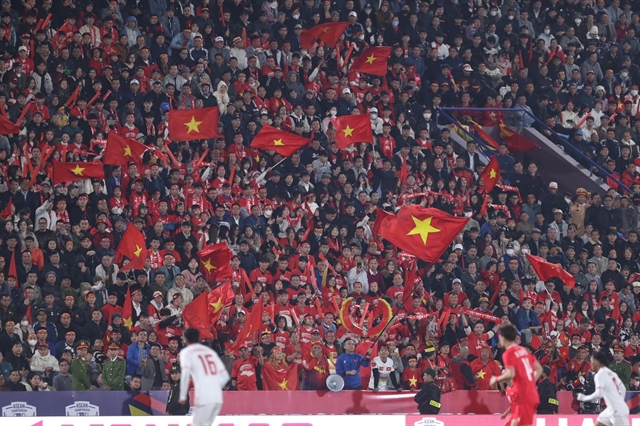 Sports
Sports

 |
| A girl celebrating Việt Nam's victory on the street in Hà Nội on last Thursday night. VNA/VNS Photo |
Anh Đức
"Vietnamese football is back," said coach Kim Sang-sik after their staggering 4-0 win against Myanmar in the group stage.
Not many could imagine these words being uttered just one year ago, as the curtains were falling on the coach Philippe Troussier era. The dark times of Vietnamese football then seemed to be returning, with dismal results in all levels of competition, footballers' scandals popping up on front pages (and on this column every Monday), and the national Mỹ Đình Stadium marred by mismanagement and a deteriorating pitch, among other issues.
Not many fans had high hopes for things to get better -- at least not in just one calendar year. Talk of the "ten-year football cycle" returned about how Việt Nam was set to be embarrassed in the ASEAN Cup, with the most cynical predicting a group stage exit or a loss to minnows like Laos.
Outside of football, 2024 was regarded as a year in which things did not go well for many Vietnamese, an ironic parallel to the nation's football performance.
There were losses, there were disasters, there was grief and disappointment all around.
Near the end of 2024, just before the competition started, a social media trend started on the social network Threads that brought up nostalgic memories of the year 2018.
A post that garnered thousands of replies asked: "Why are so many people calling the Tết of 2018 the best Tết holiday ever?"
The Tết of 2018 happened just one week after Việt Nam's fairytale run at the 2018 AFC U23 Championship, in which the holiday was preceded by weeks of endless spontaneous parades and celebrations of the kind not seen in decades.
Despite losing, the Việt Nam under-23's performance back then created a butterfly effect that impacted the morale and pride of the Vietnamese people nationwide. It is that pride that "excelled beyond the boundaries of sports, and created a euphoria that influenced the country to create unbelievable breakthroughs in socio-economic aspects", said a narrator in the documentary series Việt Nam of the Hồ Chí Minh Era by Nhân Dân TV.
I have long believed that there is a connection between sports and a nation's prosperity. Nations such as the United States, China and Russia all have sporting talents and sporting achievements to point at and inspire their people. An American child could always look at Stephen Curry as an inspiration, a Chinese child could look up to Yao Ming and Lin Dan, while Russians are inspired by Maria Sharapova.
Sport is not just a pastime or entertainment; it connects us through a shared passion that eliminates our daily worries. If someone tells you that they do not feel a jolt of happiness whenever their favourite sports team or their nation's athletes are winning, they are lying.
"I think for a long while, we've not been feeling too good about ourselves in this country, and it's wonderful to see people being thrilled at an event," said the late Terry Venables before the Euro '96 semi-final between England and Germany.
Despite England not winning the Euros at home back then, Euro '96 remained one of the best memories for English Gen X and Millennials, akin to the Vietnamese nostalgia of 2018.
After two years of trophy drought and a year of total disappointment, the Vietnamese national team brought back the frenzy, the long party night after Việt Nam's first-leg victory against Thailand last Thursday.
The feeling, the memories of 2018 came racing back. There was no fracas, no traffic-related anger issues. Just people driving on the streets and high-fiving each other.
Vietnamese football is back. And we have before us 90 minutes to solidify that statement.
If they don't win, no matter. We stand up and rise again, as Việt Nam always does.
But if they win, what could be a greater start for the 'era of the nation on the rise'?
If they win, we win. VNS




